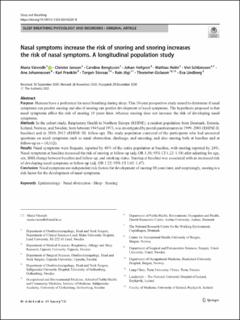| dc.description.abstract | Purpose
Humans have a preference for nasal breathing during sleep. This 10-year prospective study aimed to determine if nasal symptoms can predict snoring and also if snoring can predict development of nasal symptoms. The hypothesis proposed is that nasal symptoms affect the risk of snoring 10 years later, whereas snoring does not increase the risk of developing nasal symptoms.
Methods
In the cohort study, Respiratory Health in Northern Europe (RHINE), a random population from Denmark, Estonia, Iceland, Norway, and Sweden, born between 1945 and 1973, was investigated by postal questionnaires in 1999–2001 (RHINE II, baseline) and in 2010–2012 (RHINE III, follow-up). The study population consisted of the participants who had answered questions on nasal symptoms such as nasal obstruction, discharge, and sneezing, and also snoring both at baseline and at follow-up (n = 10,112).
Results
Nasal symptoms were frequent, reported by 48% of the entire population at baseline, with snoring reported by 24%. Nasal symptoms at baseline increased the risk of snoring at follow-up (adj. OR 1.38; 95% CI 1.22–1.58) after adjusting for age, sex, BMI change between baseline and follow-up, and smoking status. Snoring at baseline was associated with an increased risk of developing nasal symptoms at follow-up (adj. OR 1.22; 95% CI 1.02–1.47).
Conclusion
Nasal symptoms are independent risk factors for development of snoring 10 years later, and surprisingly, snoring is a risk factor for the development of nasal symptoms. | en_US |

